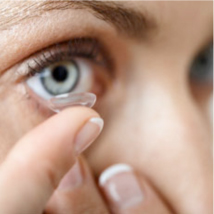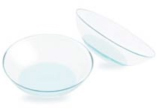
CONTACT LENSES - KERATOCONUS TREATMENT

In some cases, it is possible to manage keratoconus using contact lenses. No one lens is best suited for every type of keratoconus. The needs of each individual are carefully weighed to find the lens that offers the best combination of visual acuity, comfort and corneal health.
Soft Lenses
The effectiveness of soft lenses is limited because the soft lens often takes the same shape of the irregular surface of the cornea. One option is a thicker soft lens which retain more of a rigid shape. There are soft contact lens designs being used for keratoconus, and they can be helpful in mild to moderate cases.
RGP Contact Lenses
Rigid Gas Permeable (RGP or GP) contact lenses do a better job of correcting the underlying irregular cornea than soft contact lenses because they don't bend or change shape. "Rigid" defines the type of lens. "Gas Permeable" describes the lens material. There are many different RGP lens designs.
"Piggy-backs"
This is a two lens combination which requires an RGP lens to be worn on top of a soft lens. The RGP lens provides clear vision and the soft lens provides a more comfortable feel.

Hybrid Lenses
For some, this unique single lens design combines the vision benefits of an RGP lens with the comfort of a soft lens. The hybrid lens has an RGP center surrounded by a soft peripheral "skirt".
Scleral Lenses
These lenses have a large diameter that covers the white part of the eye (called the sclera). Scleral lenses have many advantages because of their size. Two major benefits are that they do not fall out and dust or dirt particles cannot get under them during wear. They are also surprisingly comfortable to wear because the edges of the lens rests above and below the eye lid margins so they're hardly noticeable when blinking.
We recommend you discuss with your eye doctor which correction options are best for you.


